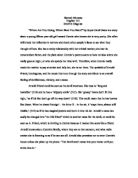Transcendentalism in Walden
Transcendentalism, a religious philosophical and literary movement, arose in New England in the middle of the nineteenth century. Critics generally cite 1836 to 1846 as the years when the movement flourished, although its influence continued to be felt in later decades, with some works considered part of the movement not being published until the 1850s. Transcendentalism began as a religious concept rooted in the ideas of American democracy. When a group of Boston ministers, one of whom was Ralph Waldo Emerson, decided that the Unitarian Church had become too conservative, they espoused a new religious philosophy, one which privileged the inherent wisdom in the human soul over church doctrine and law.
Among Transcendentalism's followers were writers Ralph Waldo Emerson, Henry David Thoreau, Margaret Fuller, and Walt Whitman; educator Bronson Alcott; and social theorists and reformers Theodore Parker and William Ellery Channing. Authors Nathaniel Hawthorne, Herman Melville, Emily Dickinson, and Edgar Allen Poe also felt the influence of Transcendentalism. Important works from the movement include Emerson's Nature, "The American Scholar," and "Self Reliance"; Thoreau's Walden; Fuller's Woman in the Nineteenth Century; and Whitman's Leaves of Grass. Novels such as Melville's Moby Dick and Hawthorne's The Blithedale Romance also had transcendentalist leanings.
Transcendentalism, a religious philosophical and literary movement, arose in New England in the middle of the nineteenth century. Critics generally cite 1836 to 1846 as the years when the movement flourished, although its influence continued to be felt in later decades, with some works considered part of the movement not being published until the 1850s. Transcendentalism began as a religious concept rooted in the ideas of American democracy. When a group of Boston ministers, one of whom was Ralph Waldo Emerson, decided that the Unitarian Church had become too conservative, they espoused a new religious philosophy, one which privileged the inherent wisdom in the human soul over church doctrine and law.
Among Transcendentalism's followers were writers Ralph Waldo Emerson, Henry David Thoreau, Margaret Fuller, and Walt Whitman; educator Bronson Alcott; and social theorists and reformers Theodore Parker and William Ellery Channing. Authors Nathaniel Hawthorne, Herman Melville, Emily Dickinson, and Edgar Allen Poe also felt the influence of Transcendentalism. Important works from the movement include Emerson's Nature, "The American Scholar," and "Self Reliance"; Thoreau's Walden; Fuller's Woman in the Nineteenth Century; and Whitman's Leaves of Grass. Novels such as Melville's Moby Dick and Hawthorne's The Blithedale Romance also had transcendentalist leanings.







